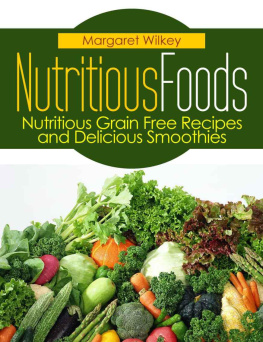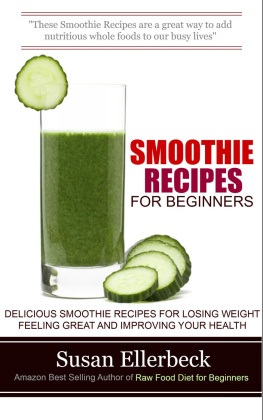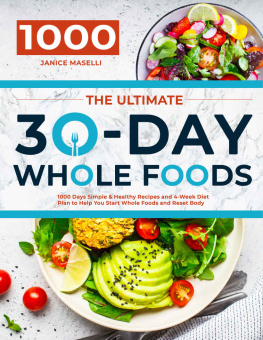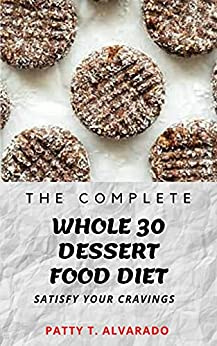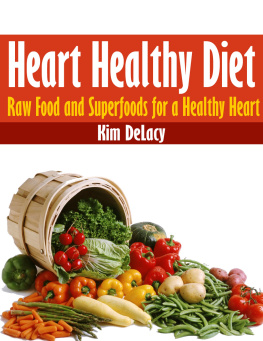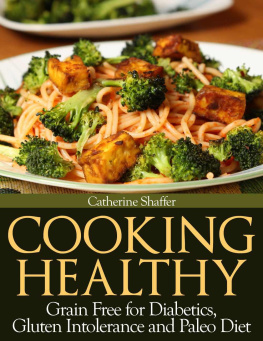Nutritious Foods
Nutritious Grain Free Recipes and Delicious Smoothies
Margaret Wilkey
Copyright 2013 Margaret Wilkey
All rights reserved.
Table of Contents
Nutritious Foods Introduction
Eating nutritious foods is the best way to help the body to build a strong immune system. Food is one of the key players in the state of our health and well-being. Of course, one of the major benefits of eating healthy is weight loss, but really, maintaining an ideal weight is simply a benefit of keeping a healthy diet. When we hear the saying, "you are what you eat," you need to believe it. Our body pulls the nutrients from the foods we eat and uses the nutrients within the body. If we eat nothing but junk, it will pull the junk into our body. The result is weight gain and undesirable health conditions.
The food we eat directly affects brain function. If you look at the symptoms of low or high blood sugar you will find mental issues among the many physical symptoms. The cognitive function of our brain needs to be clear in order to think right, to reason, and to call to memory. Without the proper nutrients that encourage brain health the cognitive function dwindles and we fail at doing simple tasks. Having deficiencies in certain nutrients can cause imparity in brain function. For example, vitamin B12 helps to strengthen the cognitive function of the brain. A deficiency in this nutrient will cause us to be lethargic in our thought process. It makes sense that if the brain functions at optimum levels it will aid the body in functioning right as well.
The number one body system food affects is the immune system. If we have a strong immune system, we are able to fight off infectious and debilitating diseases. We are able to withstand stress and strain better too. To beef up the immune system one needs to include a diet rich in anti oxidants and a well balance of protein, carbohydrates, and fats. We get these vital nutrients and substances from the very foods we eat. By choosing to eat healthier foods, we are enabling the immune system to be strong so it can aid the body in being strong and healthy.
Many people want to know if it is necessary to eat healthy foods all the time. Sometimes, for whatever reason, be it the lack of finances, time, or knowledge, people have to eat or choose to eat an unhealthy diet of fast or processed foods (junk food). Sometimes people may feel they should only "eat nutritious" foods and meals only when necessary, i.e. when they are sick, or when they wish to lose weight, etc. Going on a "nutritious eating plan" should not be viewed as a temporary fix. It may produce short term effects (lose weight, get over an illness) to eat right, but if you go right back to bad eating habits, eventually your body will go back to the way it was. Developing healthy eating habits is a change of lifestyle, one you should embrace as a change you will practice the rest of your life.
All through life, a body goes through "seasons and cycles." For example, women go through childbearing years and then menopause. Men go through different hormonal changes as well. These systems are directly affected by our diets. It is so important to give our body a fighting chance by making sure we give ourselves the proper nutrients to keep each system in the body going strong and balanced.
When our immune system goes down, nutrition is vital to being able to overcome it and to gain back the health we had prior to the illness. It makes more sense to practice healthy eating habits now, before we get sick. By having a stronger immune system, we are able to fight off illnesses.
Part of this book covers the Grain Free Diet. You may be wondering why go grain free. There are many reasons to go on a grain free diet among them is the benefits you get if you have a gluten intolerance or allergy. Other than that, there are other reasons a grain free diet is beneficial.
Many argue that grains provide many vital nutrients and that grains in the diet should not be skipped. While some grains do provide nutrients, these same nutrients can be found in other food sources. Grains provide B vitamins, which are vital to the body; however, you can find B vitamins in flax seeds, lamb's liver, and even sesame seeds. Fiber is another concern and this can be found in brown rice, greens like collard greens and green peas.
Grains are hard to digest. Many have a difficult time with whole grains going through their digestive system and causing the digestive tract not to absorb nutrients properly. Some people will find grains cause their immune system to respond unfavorably causing a leaky gut condition. This happens when these grains break through the intestinal walls.
Chronic inflammation is linked to grain consumption. For people who suffer from conditions that are aggravated by inflammation they will want to steer clear of foods that may cause it. Conditions such as allergies, cardiovascular disease, arthritis, bone loss, asthma, and other equally debilitating conditions are aggravated by inflammation. By staying away from inflammation causing foods these conditions will be less painful, less counterproductive and may even go away.
Humans have not consumed grains for a long time, meaning our earliest ancestors did not eat grains. Grains actually emerged in the food chain about 10,000 years ago. Research shows that our prehistoric ancestors were healthier than us partly due to their diets of meat, raw fruits and vegetables and the absence of grains (and legumes too.)
Unless a grain is prepared in such a way to help the body retain nutrients, it will have the opposite effect; it will in fact cause the body not to absorb the vital nutrients it needs. This works in opposition to what your body needs, even though you may be consuming the foods with these nutrients, if you also consume ill-prepared grains, those nutrients will not absorb.
Section 1:
Grain Free Recipes
There's something absolutely delicious about a freshly baked loaf of bread, a crispy waffle, or a tasty cake hot out of the oven! These foods all have one thing in common: they're made with grain or wheat flour. Cooking with wheat flour and grain is something that everyone does, and it produces a whole lot of delicious foods.
Unfortunately for many, grain and wheat are things that they cannot enjoy. Gluten intolerance can be a serious problem for many people, and they are unable to eat foods that contain lots of grain or wheat. When they do, they have serious digestive problems, or their body can react strongly and negatively to the gluten in the grain that they are eating.
Gluten has been linked to a number of problems. Interestingly enough, the body often sees gluten as being a foreign substance that it can't process. While gluten is commonly found in the food we eat, it wasnt always part of our diet. The human body can't always process this gooey, sticky protein easily, and it can be a bit hard on the body if you happen to be sensitive to it. Even those without celiac problems may not be able to handle the gluten, as their bodies react to the "foreign substance" by attacking it with antibodies.
Cutting grain out of your diet can help to reduce your risk of health problems, especially if you have celiac disorder or other gluten-sensitive problems. However, even for those that don't have these health problems, it may be a good idea to cut gluten out of your diet. Many people don't have celiac disease, and yet they still experience the drawbacks of eating gluten.
In an article in the New Zealand edition of Stuff magazine, an article by a world-renowned expert on food allergies, Dr. Rodney Ford, states, "Gluten causes tiredness, anxiety and stress. The medical world accepts it can damage the gut, but it can also damage the brain, skin and nerves. Until now, many of these illnesses have been blamed on everything from stress at home to other medical conditions, including
Next page
